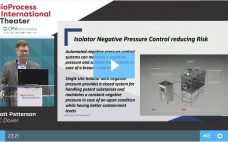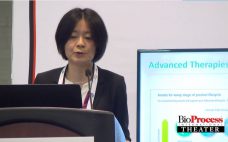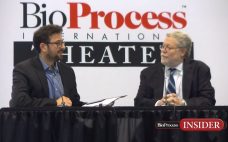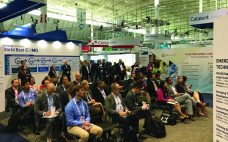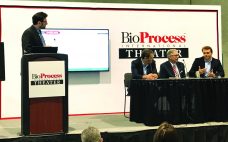Ramon LeDoux, senior business development manager, YMC Process Technologies LeDoux focused his presentation on downstream bioprocess techniques, specifically scaling up multicolumn processes. Relatively new advances in twin-column technology have brought significant increases in productivity over the past several years. That led YMC Process Technologies to adopt a twin-column approach. A challenge with traditional chromatography has been to balance purity, throughput, and recovery. “If purity is your standard,” LeDoux stated, then “typically if you want high recoveries, your throughput suffers. Overloading…
BPI Theater
Biopharmaceutical Indications and Targets: Past, Present, and Future
Dawn M. Ecker, consultant and bioTRAK database manager, BioProcess Technology Group Over the past 15 years, the BioProcess Technology Group (BPTG, formerly BioProcess Technology Consultants) has built and maintained the proprietary internal bioTRAK database to track recombinant biopharmaceutical products from preclinical development through US and EU commercialization. In addition, the firm is watching other biopharmaceutical markets, including for gene therapies and modified cell therapies. BPTG also is considering regional products for regional markets and tracking manufacturing capacity required to manufacture…
CMC Considerations for Commercial-Ready ADC Manufacturing Processes to Enable Accelerated Timelines
Courtney Morgret, senior scientist, AbbVie Morgret’s presentation focused on antibody–drug conjugate (ADC) manufacturing and ways to accelerate it. She pointed out that ADCs have the potential to be filed for market approval based on phase 2 data. A few such products have been approved and are on the market today, with many more in the pipeline. ADCs provide an opportunity to address unmet medical needs. The task of a CMC (chemistry manufacturing and controls) group is to move a product…
Single-Use Technology for Containment During ADC Handling
Scott Patterson, vice president of commercial sales, ILC Dover Antibody–drug conjugates (ADCs) are increasing in popularity, with a robust pipeline that could lead to a US$10-billion market over the next several years. These novel treatments combine the high potency of small molecules with the targeting ability of monoclonal antibodies (MAbs). However, the challenge of such treatments is that they combine a highly potent, toxic material with a large protein that will target a treatment area. As a result, manufacturing the…
A Platform Production Process for Manufacturing Viral Vector and Vaccine Therapeutics Using Vero Cells
Yan Zhi, program design technical lead, Fujifilm Diosynth Biotechnologies Fujifilm Diosynth Biotechnologies (FDB) is a world-leading contract development and manufacturing organization (CDMO) with over 25 years of experience using biologicals and more than 310 projects including six licenses. Production sites are located in North Carolina and Texas. In Texas, the flexible biomanufacturing facility can handle production from preclinical to current good manufacturing practices (CGMP) commercial manufacturing. Facilities and capabilities include state-of-the-art process development; mobile cleanroom (MCR) technology with fully segregated…
BioProcess Insider BPI Theater @ BIO 2018 Interviews – Tuesday
BioProcess Insider brings the news as it breaks. At the BPI Theater @BIO, editor Dan Stanton conducted a series of interviews live on stage to report on the latest movements in the biomanufacturing industry to start each busy day of dealmaking in Boston. Below we summarize his DAY ONE conversations with a number of biopharmaceutical executives on Tuesday 5 June 2018. You can watch the full interviews online at www.bioprocessintl.com/BIO-Theater-2018. Andy Topping, Chief Scientific Officer, Fujifilm Diosynth Biotechnologies Gene therapies show…
Manufacturing Automation for Patient-Scale Cell Therapies
Nina Bauer, associate director of autologous cell therapy commercial development, Lonza Pharma and Biotech Lonza Emerging Technologies is focusing on cell and gene therapies. Lonza now has expertise in different cell and vector types, constructs, process and assay development, and platform technologies for both clinical and commercial manufacturing. This includes taking a concept through commercial manufacturing. Lonza just opened a site in Houston, TX, and another in the Netherlands, as well as partnering with Nikon in the Asian market. Cell…
Acoustic Cell Processing: An Innovation in Cell-Therapy Manufacturing
Richard Grant, chief product officer, FloDesign FloDesign is experimenting with applications of acoustics to cell-therapy manufacturing. An electric transducer is attached to a closed-flow system and generates forward propagating waves that are reflected as backward propagating waves. This sets up three-dimensional standing waves within the cell (flow) chamber. When cells enter the flow channel, acoustic forces cause then to cluster within the nodes of those standing waves, ultimately settling out through enhanced gravitational means. Acoustic cell processing is scalable and…
Therapeutic Modalities: Business and Manufacturing Strategies Influencing Decisions to Develop One Therapy Type Rather Than Another
Moderator Patricia Seymour, with John Lee, Michael Kaufman, Jennifer Michaelson, and Weichang Zhou Following introductions of the panelists and their companies’ technologies, moderator Patricia Seymour began the discussion about challenges related to choosing different modalities and addressing related manufacturing concerns. Targeting Modalities Michaelson began by describing how Cullinan Oncology selects its targets and modalities, how it approaches those early phase decisions, and what its primary driver is to get into the clinic as quickly as possible. She talked about challenges…
Feeding the Demand for Cell and Gene Therapy Production
Moderator Dan Stanton, with Ohad Karnieli, Alan Moore, and David Brindley Moderator Dan Stanton introduced the second roundtable of Tuesday morning by commenting on the recent spate of approvals for CAR-T cell and gene therapies. With large biopharmaceutical and biotechnology companies devoting scientists and funds toward these next-generation therapies, contract manufacturing organizations (CMOs) also are investing in opportunities to expand capacity and expertise. As the panelists introduced themselves, they raised two key points for discussion: The contracting model for advanced…




